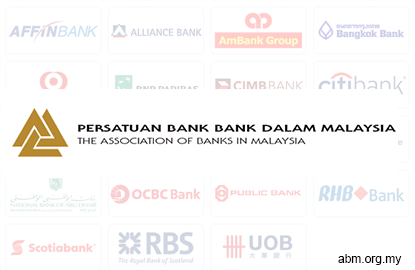
KUALA LUMPUR (June 1): The hike in the costs of funding has prompted a few banks to increase their base rates (BR) and base lending rates (BLR) recently, the first time since January 2015, when the BLR structure was replaced with a new BR system.
The Association of Banks in Malaysia (ABM) explained in a statement today that the downward trend of the three-month Kuala Lumpur Interbank Offered Rate (KLIBOR) in the first quarter of this year was "insufficient to offset the rise in the total funding costs experienced throughout 2015 and 2016".
"This is the first time these banks have revised their BR and BLR. Despite the increase, the BR of these banks remain below the average BR for the industry of 3.89% as at Q1 2016," it said.
It also noted, from Jan 2, 2015, commercial banks may revise the level of their reference rates (both BR and BLR) in response to a change in their funding costs, regardless of whether there is a change to the overnight policy rate (OPR). This is in line with the new Reference Rate Framework which was announced by Bank Negara Malaysia in 2014.
It explained that commercial banks generally raise funds from various sources, including deposits, wholesale and the equity markets.
"In addition to the OPR, the cost of raising funds would depend on several factors such as the banks' credit ratings, market funding conditions and competitive pressures," it added.
Not every bank has upped the BR and BLR. The association pointed out that following the recent reduction in the Statutory Reserve Requirement (SRR) ratio from 4% to 3.5%, effective from Feb 1, a number of banks have actually reduced their BR and BLR.
"The decisions by the banks in revising their BR and BLR were in accordance with the policy framework and internal governance of the institutions concerned," it said.
Whatever the adjustments, ABM highlighted that banks are obligated to provide borrowers with particulars of the revised monthly instalment amount at least seven calendar days prior to the date the revised instalment comes into effect.
"If the change in the monthly instalment amount is less than RM50 per month or the bank's internal threshold amount (whichever is the lower), a bank is permitted to retain the borrowers' monthly repayment amount," it noted.
If, however, the change is more than RM50 per month or the threshold, banks are allowed to revise the monthly instalments unless a specific request is made by the borrower to retain the amount.
It was reported that Public Bank Bhd, Hong Leong Bank Bhd and Standard Chartered Bank have raised their BR by about 10 basis points (bps) to 3.75%, 3.94% and 3.77%, respectively, to alleviate the pressure on their net interest margins (NIM).
This was despite the three-month KLIBOR trending down 17bps to 3.67% from its recent peak of 3.84% in Dec-Jan 2016.